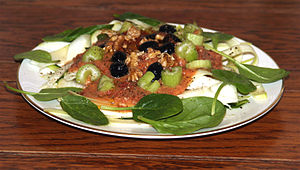Science of cooking
The application of scientific knowledge to cooking and gastronomy has become known as molecular gastronomy. This is a subdiscipline of food science. Important contributions have been made by scientists, chefs and authors such as Herve This (chemist), Nicholas Kurti (physicist), Peter Barham (physicist), Harold McGee (author), Shirley Corriher (biochemist, author), Heston Blumenthal (chef), Ferran Adria (chef), Robert Wolke (chemist, author) and Pierre Gagnaire (chef). Chemical processes central to cooking include the Maillard reaction – a form of non-enzymatic browning involving an amino acid, a reducing sugar and heat.

Science (from Latin scientia, meaning "knowledge") is a systematic enterprise that builds and organizes knowledge in the form of testable explanations and predictions about the universe.[1] In an older and closely related meaning (found, for example, in Aristotle), "science" refers to the body of reliable knowledge itself, of the type that can be logically and rationally explained (see History and philosophy below).[2] Since classical antiquity science as a type of knowledge was closely linked to philosophy. In the early modern era the words "science" and "philosophy" were sometimes used interchangeably in the English language. By the 17th century, natural philosophy (which is today called "natural science") was considered a separate branch of philosophy.[3] However, "science" continued to be used in a broad sense denoting reliable knowledge about a topic, in the same way it is still used in modern terms such as library science or political science. In modern use, "science" more often refers to a way of pursuing knowledge, not only the knowledge itself. It is "often treated as synonymous with 'natural and physical science', and thus restricted to those branches of study that relate to the phenomena of the material universe and their laws, sometimes with implied exclusion of pure mathematics. This is now the dominant sense in ordinary use."[4] This narrower sense of "science" developed as scientists such as Johannes Kepler, Galileo Galilei and Isaac Newton began formulating laws of nature such as Newton's laws of motion. In this period it became more common to refer to natural philosophy as "natural science". Over the course of the 19th century, the word "science" became increasingly associated with the scientific method, a disciplined way to study the natural world, including physics, chemistry, geology and biology. It is in the 19th century also that the term scientist was created by the naturalist-theologian William Whewell to distinguish those who sought knowledge on nature from those who sought knowledge on other disciplines. The Oxford English Dictionary dates the origin of the word "scientist" to 1834. This sometimes left the study of human thought and society in a linguistic limbo, which was resolved by classifying these areas of academic study as social science. Similarly, several other major areas of disciplined study and knowledge exist today under the general rubric of "science", such as formal science and applied science. Science in a broad sense existed before the modern era, and in many historical civilizations, but modern science is so distinct in its approach and successful in its results that it now defines what science is in the strictest sense of the term. Much earlier than the modern era, another important turning point was the development of the classical natural philosophy in the ancient Greek-speaking world. Pre-philosophical Science in its original sense is a word for a type of knowledge (Latin scientia, Ancient Greek episteme), rather than a specialized word for the pursuit of such knowledge. In particular it is one of the types of knowledge which people can communicate to each other and share. For example, knowledge about the working of natural things was gathered long before recorded history and led to the development of complex abstract thinking, as shown by the construction of complex calendars, techniques for making poisonous plants edible, and buildings such as the pyramids. However no consistent distinction was made between knowledge of such things which are true in every community, and other types of communal knowledge such as mythologies and legal systems.